牛津译林版七年级下册 Unit 2 period 3 Grammar课件(共56张PPT)
文档属性
| 名称 | 牛津译林版七年级下册 Unit 2 period 3 Grammar课件(共56张PPT) |
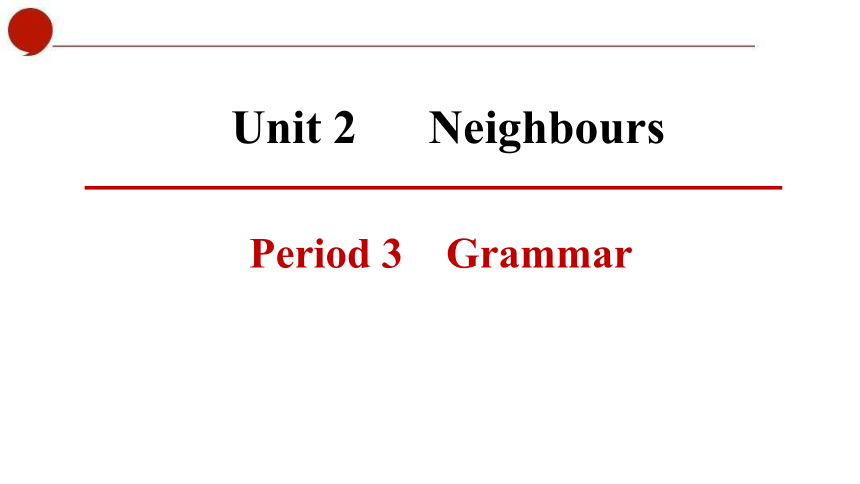
|
|
| 格式 | ppt | ||
| 文件大小 | 30.7MB | ||
| 资源类型 | 教案 | ||
| 版本资源 | 牛津译林版 | ||
| 科目 | 英语 | ||
| 更新时间 | 2023-05-18 00:00:00 | ||
图片预览

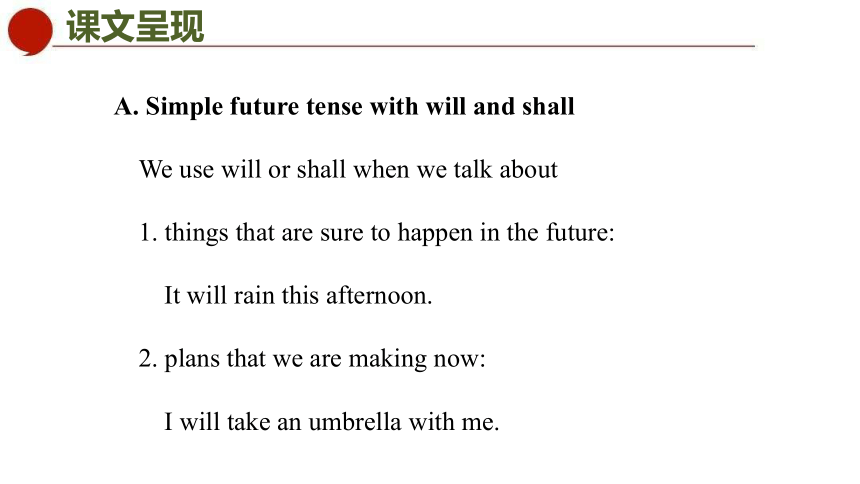
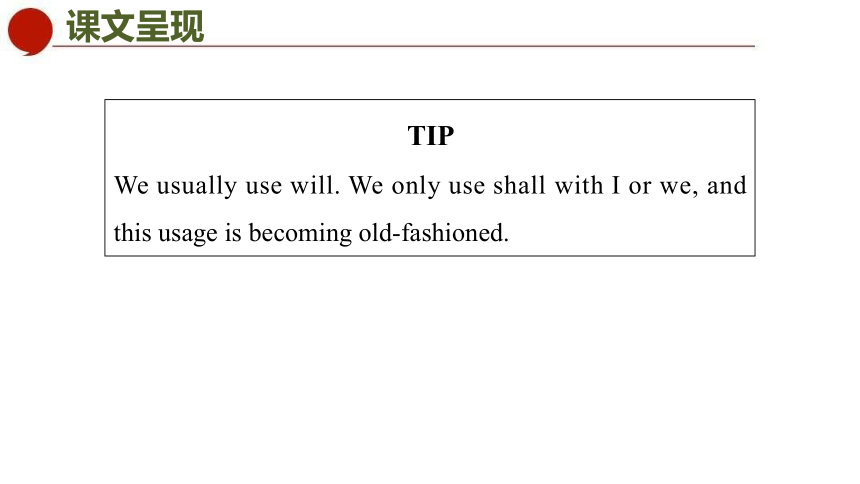
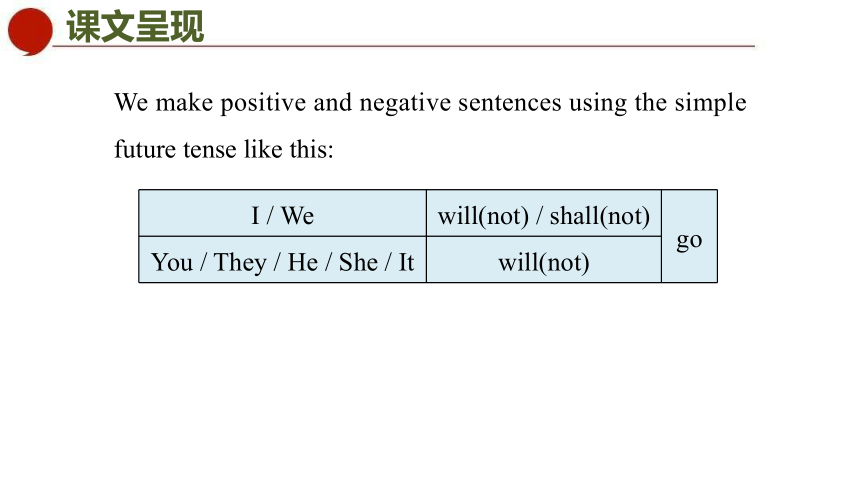
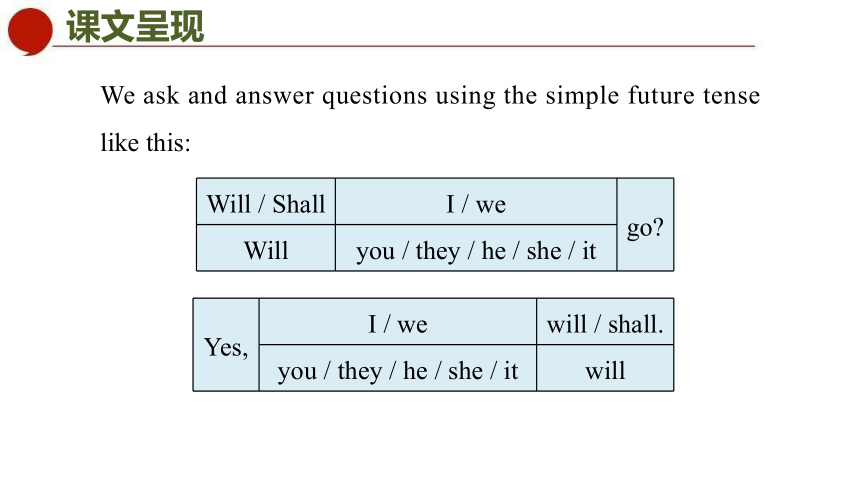
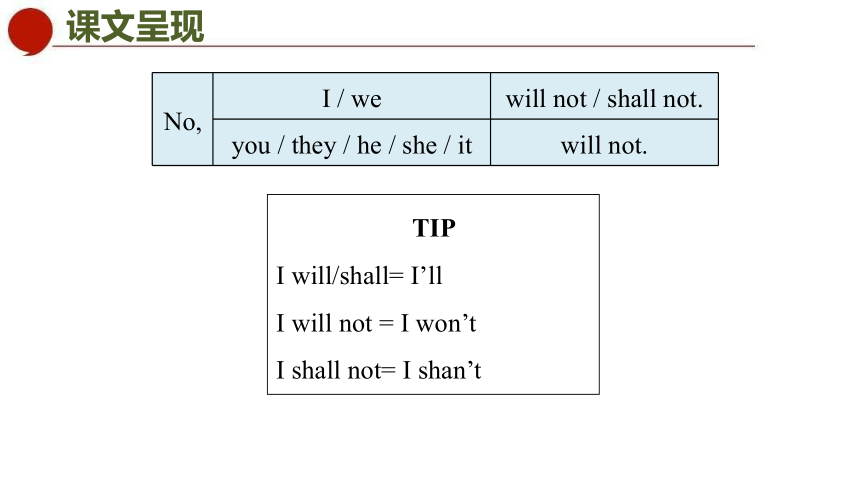
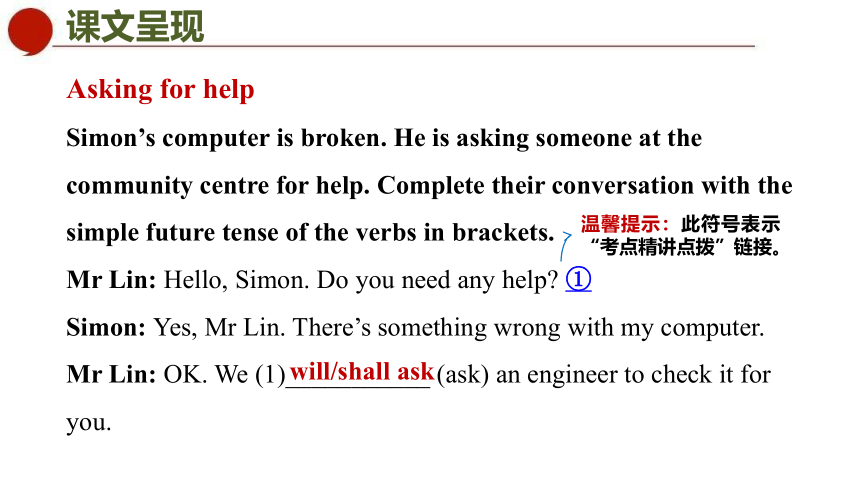
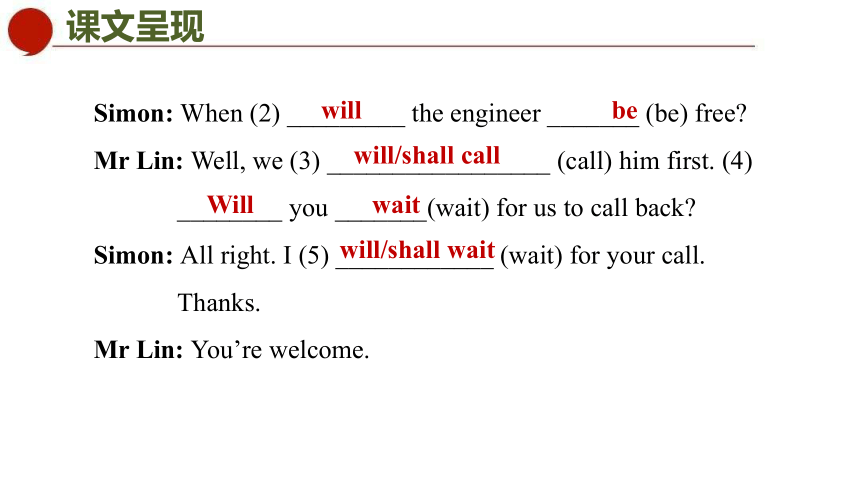
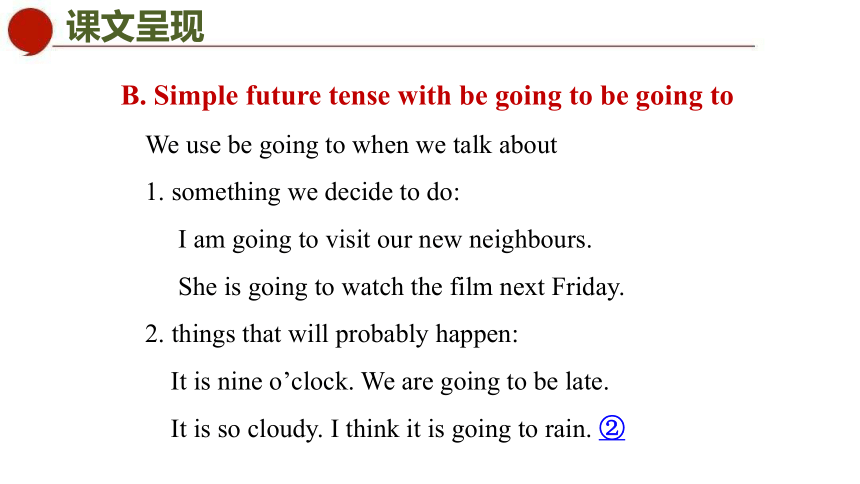
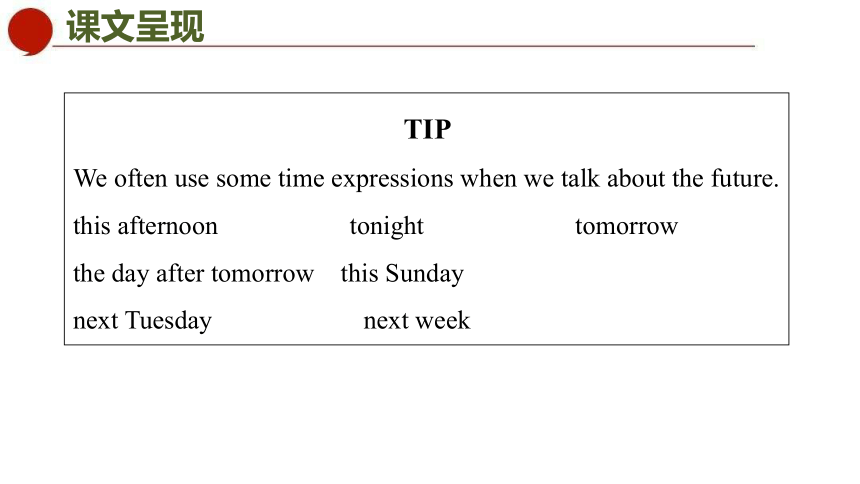
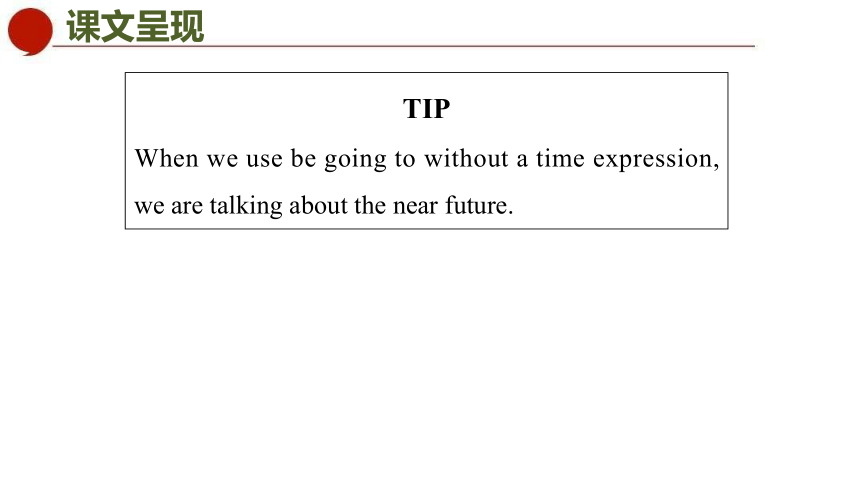
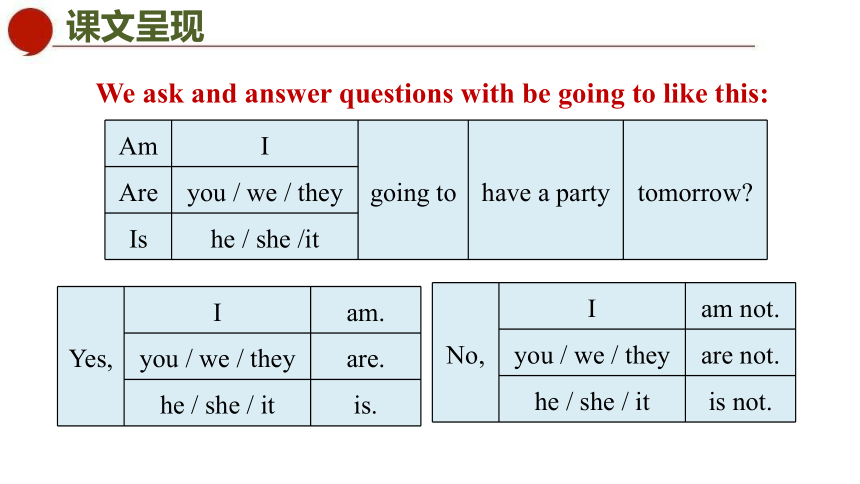
文档简介
(共56张PPT)
Period 3 Grammar
Unit 2 Neighbours
A. Simple future tense with will and shall
We use will or shall when we talk about
1. things that are sure to happen in the future:
It will rain this afternoon.
2. plans that we are making now:
I will take an umbrella with me.
TIP
We usually use will. We only use shall with I or we, and this usage is becoming old-fashioned.
We make positive and negative sentences using the simple future tense like this:
I / We will(not) / shall(not) go
You / They / He / She / It will(not)
We ask and answer questions using the simple future tense like this:
Will / Shall I / we go
Will you / they / he / she / it
Yes, I / we will / shall.
you / they / he / she / it will
No, I / we will not / shall not.
you / they / he / she / it will not.
TIP
I will/shall= I’ll
I will not = I won’t
I shall not= I shan’t
Asking for help
Simon’s computer is broken. He is asking someone at the community centre for plete their conversation with the simple future tense of the verbs in brackets.
Mr Lin: Hello, Simon. Do you need any help ①
Simon: Yes, Mr Lin. There’s something wrong with my computer.
Mr Lin: OK. We (1)___________ (ask) an engineer to check it for you.
温馨提示:此符号表示“考点精讲点拨”链接。
will/shall ask
Simon: When (2) _________ the engineer _______ (be) free
Mr Lin: Well, we (3) _________________ (call) him first. (4) ________ you _______(wait) for us to call back
Simon: All right. I (5) ____________ (wait) for your call. Thanks.
Mr Lin: You’re welcome.
will be
will/shall call
Will wait
will/shall wait
B. Simple future tense with be going to be going to
We use be going to when we talk about
1. something we decide to do:
I am going to visit our new neighbours.
She is going to watch the film next Friday.
2. things that will probably happen:
It is nine o’clock. We are going to be late.
It is so cloudy. I think it is going to rain. ②
TIP
We often use some time expressions when we talk about the future.
this afternoon tonight tomorrow
the day after tomorrow this Sunday
next Tuesday next week
TIP
When we use be going to without a time expression, we are talking about the near future.
We ask and answer questions with be going to like this:
Am I going to have a party tomorrow
Are you / we / they
Is he / she /it
Yes, I am.
you / we / they are.
he / she / it is.
No, I am not.
you / we / they are not.
he / she / it is not.
TIP
are not = aren’t
is not = isn’t
Planning a day out
Simon is telling Amy about his plan for a day out with his uncle’s family. Help him use the correct forms of be going to to talk about his plan.
Simon: Hi, Amy. My parents and I are planning a day out with my uncle’s family the day after tomorrow.
Amy: Great! What (1) _______ you ______________(do)
are going to do
Simon: I (2) __________________(buy) some food, and my cousin Annie (3) ________________(buy) some plates and forks.
Amy: What (4) _______ your parents ___________________(do)
Simon: They (5) _______________________ (bring) some water.
Amy: How about your uncle
Simon: He (6) __________________ (make) a fire. ③
Amy: And your aunt What (7) ______ she _______________(do)
Simon: She (8) _____________________ (cook) some food.
am going to buy
is going to buy
are going to do
are going to bring
is going to make
is going to do
is going to cook
①Do you need any help
need /ni d/ v. 需要
need 的用法总结
考点1
实义动词 意为“需要”,有人称、数及时态的变化 need+n. 需要某物
need to do sth. 需要做某事
need doing sth. 某事需要被做
情态动词 无人称和数的变化 need+v. 需要做某事
名词 “需要” be in need 需要
e.g. The olive tree grows in rocky places and it doesn’t need much water.
橄榄树生长在多岩石的地方,它不需要太多的水。
Does your father need any help
你爸爸需要帮助吗
He doesn’t need to do so much work.
他不需要做这么多工作。
实义动词
need+n.
He needn’t stay long.
他不必待很久。
A friend in need is a friend indeed.
患难见真情(谚语)。
She needs to go out for a walk.
她需要出去散散步。
My hair needs cutting.
我需要理发了。
情态动词
n. “需要”
中考在线1:A friend in need is a friend indeed. All of us need a friend ______. [绥化]
A. to talk with B. talking with C. to talk
A
【点拨】考查非谓语动词。句意:患难见真情。我们所有人都需要一个朋友来交谈。talk with 意为“和……交谈”;不定式作后置定语表目的。
中考在线2:I ______ take too much money with me. I like to pay on the mobile phone. [湘潭]
A. mustn’t B. shouldn’t C. needn’t
【点拨】考查情态动词辨析。句意:我不需要随身带太多的钱。我喜欢用手机支付。 mustn’t 禁止;shouldn’t 不应该;needn’t 不必。根据语境“我喜欢用手机支付”可知,我不必随身带太多的现金。
C
返回
温馨提示:可返回原文
②It is so cloudy. I think it is going to rain.
rain /re n/ vi. 下雨
e.g. It’s going to rain. 天将要下雨。
There’s a lot of rain this year.
今年雨水很多。
考点2
v.
n.
雨下得大用heavily
或者hard 修饰哦!
一语辨异:It is raining heavily outside. But the
children are playing football in the rain. This is really a rainy season. 外面正下着大雨。但是孩子们正在雨中踢足球。这真是一个多雨的季节。
拓展:常见的与天气有关的词:
sun(太阳) → sunny(晴朗的)
cloud(云) → cloudy(多云的)
rain(雨) → rainy(多雨的)
wind(风) → windy(多风的)
snow(雪) → snowy(多雪的)
中考在线3:The weather report says it will be _______ (rain) for two more days, and then the sun will come out on Tuesday. [南京]
【点拨】句意:天气预报说雨将要再下两天,星期二太阳将会出来。空格处作表语,要用rain 的形容词。
rainy
返回
③He is going to make a fire.
fire /'fa (r)/ n. 火
e.g. It’s dangerous to play with fire. 玩火是危险的。
There was a fire last night. 昨晚有一场火灾。
When there’s a fire, you should use the cloth to cover your mouth and nose.
当火灾发生时,你应该用布捂住你的嘴和鼻子。
考点3
n. 火灾
Come and get warm by the fire.
到炉火边来取暖。
The fireman saved a baby.
消防员救了那个小孩。
n. 炉火
n. 救火员,消防员;复数为firemen
fire 的相关短语:① make a fire 生火
② catch fire 着火 ③ be on fire 着火
④ put out the fire 灭火 ⑤ play with fire 玩火
中考在线4:你会生火吗
Can you ________ ________ _________
make a fire
返回
概念:一般将来时表示将来发生的动作或存在的状态。常用的时间状语有:tomorrow, the day after tomorrow, soon, in a week, next week/month 等。
考点1
一般将来时
构成:
(1)肯定句
① 主语+be(am/is/are)+going to+ 动词原形+ 其他.
e.g. I’m going to attend a meeting next week.
下星期我将要参加一个会议。
②主语+will+ 动词原形+ 其他.
e.g. I’ll go and visit her next Friday.
下星期五我将要去拜访她。
考点2
③主语(I/We)+shall+ 动词原形+ 其他.
e.g. Next week I shall be in Scotland.
下周我将要在苏格兰了。
④ be doing 也可以表示将来。
常用于这种结构的动词有come, go, leave, start, begin 等短暂性动词。
e.g. We are leaving for Beijing next week.
我们下周将动身去北京。(注:I will 的缩写形式为I’ll。)
中考在线1:—Is Helen here
—No, she isn’t here. She ______ in half an hour.
A. arrives B. arrived
C. will arrive D. has arrived
C
【点拨】考查动词时态。句意: — 海伦在这里吗 —不,她不在这儿。她将在半小时后到。根据时间状语“in half an hour”可知,句子要用一般将来时。
中考在线2:Thanks for letting us borrow your camera. We ______ it to you next Monday. [临沂]
A. return B. will return C. have returned
【点拨】考查动词时态。句意:谢谢你借给我们你的相机。我们将在下周一把它还给您。根据“next Monday”可知用一般将来时。
B
中考在线3:—The coffee’s finished!
—Oh, sorry! I _______ to the shop to get some. [江西]
A. am going B. was going
C. went D. have gone
【点拨】考查动词时态。句意:—咖啡已经用完了!—哦,对不起。我正打算去商店买一些。由横线前面的“sorry”及后面的“to the shop to get some”可知,“我”正准备去商店买一些咖啡,此处应用现在进行时表示将来。
A
(2) 否定句:分别在be, will, shall 后面加not; will not 和shall not 可缩写为won’t 和 shan’t。
e.g. She won’t do it tomorrow.
明天她将不会做这件事。
(3)一般疑问句:分别将be, will, shall 提到句首。
e.g. Will you do it tomorrow
明天你将做这件事吗
(4)特殊疑问句:特殊疑问词+ 一般疑问句+ 其他
e.g. What will you do tomorrow
明天你将做什么
注意事项
(1) will 除用于一般将来时中,还可表示意愿、邀请、要求等。
e.g. I’ll be glad to help you. 我很乐意帮助你。
Will you go shopping with me
你愿意和我一起去购物吗
Will you please not talk 请不要讲话好吗
考点3
(2) shall 用于第一人称I 或we 作主语的一般疑问句,还可表示征求对方的意见或提出建议。
e.g. Shall we have a rest
我们休息一下好吗
(3) 表示根据迹象判断将要发生某事,常用be going to。
e.g. Look at those black clouds. It’s going to rain.
看那些乌云。天将要下雨了。
(4)will 与be going to 的区别
be going to 强调的是在说话时刻之前已经考虑过的,即强调计划性和安排性;will 强调的是客观情况。
e.g. He is going to be a doctor when he grows up.
他长大后打算当一名医生。
He will be twenty years old next month.
下个月他将满20 岁。
(5) there be 结构的一般将来时形式为:there will be 或there be(is/are) going to be。
e.g. There is going to be a match this weekend.
这个周末将有一场比赛。
中考在线4:There ______ a basketball game next Monday. If it ______, we’ll have to put it off. [云南]
A. is going to have; will rain B. is going to have; rains
C. is going to be; rains D. is going to be; will rain
【点拨】考查动词时态。句意:下星期一_______一场篮球比赛。如果 _______,我们将不得不推迟它。第一句为There be 结构,根据“next Monday”可知,用一般将来时即There is going to be 或There will be。If 意为“如果”时,引导条件状语从句,主句用一般将来时,从句用一般现在时。
C
1. His uncle __________ (be) back in a week.
一、用所给单词的适当形式填空
【点拨】本题用寻找题眼法。根据题干中“in a week”可知用一般将来时。
will be
2. your mother __________(see) the doctor tomorrow
【点拨】本题用寻找题眼法。根据题干中“tomorrow”可知用一般将来时。
Will; see
3. Shall we __________(meet) at the school gate tomorrow morning
【点拨】本题用寻找题眼法。根据题干中“Shall”可知用动词原形。
meet
4. There ________________________(be) a meeting in our school tomorrow afternoon.
【点拨】本题用寻找题眼法。根据“tomorrow afternoon”可知用一般将来时;there be结构的一般将来时形式为there be(is/are) going to be或there will be。
is going to be/will be
5. She ____________________________________(water) the flowers the day after tomorrow.
will water / is going to water
6. —Has Jack solved the difficult math problem
—Not yet. But I believe he ______ in a few minutes. [襄阳]
A. has worked it out B. will work it out
C. was working it out D. works it out
二、单项选择
【点拨】考查动词时态。句意:—杰克解决了那道数学难题了吗 —还没有。但我相信他几分钟后 。根据时间状语“in a few minutes”可知,谓语动词用一般将来时。故选B。
B
7. Our school ______ the sports meeting next Monday.
A. held B. hold C. will hold D. has held
【点拨】考查动词时态。句意:我们学校将在下周一举办运动会。根据时间状语“next Monday”可知用一般将来时,故选C。
C
8. —I ______ to Hainan on vacation with my parents this coming summer holiday.
—That’s great! [黄冈]
A. go B. went C. will go D. have gone
【点拨】考查动词时态。句意:—我将在接下来的这个暑假和我的父母去海南度假。—那太棒了。根据 “this coming summer holiday”可知,此处应用一般将来时。故选C。
C
9. I think it is true that Jill ______ to work today because she is on a trip.
A. has come B. didn’t come
C. is coming D. will not come
D
10. —What does he say
—He says there ______ a meeting tomorrow morning.
A. is B. has C. will be D. have
【点拨】句意:—他说什么 —他说明天早上将有一个会议。根据时间状语“tomorrow morning”可知用一般将来时,故选C。
C
11. Mum will do some shopping the day after tomorrow.
(改为否定句)
Mum ________ ________ ________ shopping the day after tomorrow.
三、根据要求完成句子
won’t do any
12. Bill is going to watch TV this afternoon. (改为一般疑问句)
________ Bill ________ to watch TV this afternoon
13. We shall meet at the school gate. (对画线部分提问)
________ ________ we meet
Is going
Where shall
14. My cousin will fly to Shanghai next week. (对画线部分提问)
What ________ your cousin ________ next week
15. There was a meeting in the hall yesterday afternoon.
(用next month 改写句子)
There ________ ________ ________ ________ a meeting in the hall next month.
will do
is going to be
16. 她明天晚上给你回电话。
She ________ ________ ________ ________ tomorrow evening.
四、根据汉语意思完成句子
will call you back
17. 我想天要下雨了,咱们回家吧!
I think it ________ ________ ________ ________. Let’s go home.
18. 你明天要去看病吗
________ you ________ ________ see the doctor tomorrow
is going to rain
Are going to
19. 我们后天去看电影, 好吗
________ ________ go to the cinema ________ ________ ________ _____________
20. 著名作家格林先生,下周将要来我们学校参观。
Mr Green, a famous writer, ________ ________ our school next week.
Shall we the day
after tomorrow
will visit
本节课主要学习了以下知识点,请同学们及时巩固练习:
shall , fire , the day after tomorrow, make a fire……
Period 3 Grammar
Unit 2 Neighbours
A. Simple future tense with will and shall
We use will or shall when we talk about
1. things that are sure to happen in the future:
It will rain this afternoon.
2. plans that we are making now:
I will take an umbrella with me.
TIP
We usually use will. We only use shall with I or we, and this usage is becoming old-fashioned.
We make positive and negative sentences using the simple future tense like this:
I / We will(not) / shall(not) go
You / They / He / She / It will(not)
We ask and answer questions using the simple future tense like this:
Will / Shall I / we go
Will you / they / he / she / it
Yes, I / we will / shall.
you / they / he / she / it will
No, I / we will not / shall not.
you / they / he / she / it will not.
TIP
I will/shall= I’ll
I will not = I won’t
I shall not= I shan’t
Asking for help
Simon’s computer is broken. He is asking someone at the community centre for plete their conversation with the simple future tense of the verbs in brackets.
Mr Lin: Hello, Simon. Do you need any help ①
Simon: Yes, Mr Lin. There’s something wrong with my computer.
Mr Lin: OK. We (1)___________ (ask) an engineer to check it for you.
温馨提示:此符号表示“考点精讲点拨”链接。
will/shall ask
Simon: When (2) _________ the engineer _______ (be) free
Mr Lin: Well, we (3) _________________ (call) him first. (4) ________ you _______(wait) for us to call back
Simon: All right. I (5) ____________ (wait) for your call. Thanks.
Mr Lin: You’re welcome.
will be
will/shall call
Will wait
will/shall wait
B. Simple future tense with be going to be going to
We use be going to when we talk about
1. something we decide to do:
I am going to visit our new neighbours.
She is going to watch the film next Friday.
2. things that will probably happen:
It is nine o’clock. We are going to be late.
It is so cloudy. I think it is going to rain. ②
TIP
We often use some time expressions when we talk about the future.
this afternoon tonight tomorrow
the day after tomorrow this Sunday
next Tuesday next week
TIP
When we use be going to without a time expression, we are talking about the near future.
We ask and answer questions with be going to like this:
Am I going to have a party tomorrow
Are you / we / they
Is he / she /it
Yes, I am.
you / we / they are.
he / she / it is.
No, I am not.
you / we / they are not.
he / she / it is not.
TIP
are not = aren’t
is not = isn’t
Planning a day out
Simon is telling Amy about his plan for a day out with his uncle’s family. Help him use the correct forms of be going to to talk about his plan.
Simon: Hi, Amy. My parents and I are planning a day out with my uncle’s family the day after tomorrow.
Amy: Great! What (1) _______ you ______________(do)
are going to do
Simon: I (2) __________________(buy) some food, and my cousin Annie (3) ________________(buy) some plates and forks.
Amy: What (4) _______ your parents ___________________(do)
Simon: They (5) _______________________ (bring) some water.
Amy: How about your uncle
Simon: He (6) __________________ (make) a fire. ③
Amy: And your aunt What (7) ______ she _______________(do)
Simon: She (8) _____________________ (cook) some food.
am going to buy
is going to buy
are going to do
are going to bring
is going to make
is going to do
is going to cook
①Do you need any help
need /ni d/ v. 需要
need 的用法总结
考点1
实义动词 意为“需要”,有人称、数及时态的变化 need+n. 需要某物
need to do sth. 需要做某事
need doing sth. 某事需要被做
情态动词 无人称和数的变化 need+v. 需要做某事
名词 “需要” be in need 需要
e.g. The olive tree grows in rocky places and it doesn’t need much water.
橄榄树生长在多岩石的地方,它不需要太多的水。
Does your father need any help
你爸爸需要帮助吗
He doesn’t need to do so much work.
他不需要做这么多工作。
实义动词
need+n.
He needn’t stay long.
他不必待很久。
A friend in need is a friend indeed.
患难见真情(谚语)。
She needs to go out for a walk.
她需要出去散散步。
My hair needs cutting.
我需要理发了。
情态动词
n. “需要”
中考在线1:A friend in need is a friend indeed. All of us need a friend ______. [绥化]
A. to talk with B. talking with C. to talk
A
【点拨】考查非谓语动词。句意:患难见真情。我们所有人都需要一个朋友来交谈。talk with 意为“和……交谈”;不定式作后置定语表目的。
中考在线2:I ______ take too much money with me. I like to pay on the mobile phone. [湘潭]
A. mustn’t B. shouldn’t C. needn’t
【点拨】考查情态动词辨析。句意:我不需要随身带太多的钱。我喜欢用手机支付。 mustn’t 禁止;shouldn’t 不应该;needn’t 不必。根据语境“我喜欢用手机支付”可知,我不必随身带太多的现金。
C
返回
温馨提示:可返回原文
②It is so cloudy. I think it is going to rain.
rain /re n/ vi. 下雨
e.g. It’s going to rain. 天将要下雨。
There’s a lot of rain this year.
今年雨水很多。
考点2
v.
n.
雨下得大用heavily
或者hard 修饰哦!
一语辨异:It is raining heavily outside. But the
children are playing football in the rain. This is really a rainy season. 外面正下着大雨。但是孩子们正在雨中踢足球。这真是一个多雨的季节。
拓展:常见的与天气有关的词:
sun(太阳) → sunny(晴朗的)
cloud(云) → cloudy(多云的)
rain(雨) → rainy(多雨的)
wind(风) → windy(多风的)
snow(雪) → snowy(多雪的)
中考在线3:The weather report says it will be _______ (rain) for two more days, and then the sun will come out on Tuesday. [南京]
【点拨】句意:天气预报说雨将要再下两天,星期二太阳将会出来。空格处作表语,要用rain 的形容词。
rainy
返回
③He is going to make a fire.
fire /'fa (r)/ n. 火
e.g. It’s dangerous to play with fire. 玩火是危险的。
There was a fire last night. 昨晚有一场火灾。
When there’s a fire, you should use the cloth to cover your mouth and nose.
当火灾发生时,你应该用布捂住你的嘴和鼻子。
考点3
n. 火灾
Come and get warm by the fire.
到炉火边来取暖。
The fireman saved a baby.
消防员救了那个小孩。
n. 炉火
n. 救火员,消防员;复数为firemen
fire 的相关短语:① make a fire 生火
② catch fire 着火 ③ be on fire 着火
④ put out the fire 灭火 ⑤ play with fire 玩火
中考在线4:你会生火吗
Can you ________ ________ _________
make a fire
返回
概念:一般将来时表示将来发生的动作或存在的状态。常用的时间状语有:tomorrow, the day after tomorrow, soon, in a week, next week/month 等。
考点1
一般将来时
构成:
(1)肯定句
① 主语+be(am/is/are)+going to+ 动词原形+ 其他.
e.g. I’m going to attend a meeting next week.
下星期我将要参加一个会议。
②主语+will+ 动词原形+ 其他.
e.g. I’ll go and visit her next Friday.
下星期五我将要去拜访她。
考点2
③主语(I/We)+shall+ 动词原形+ 其他.
e.g. Next week I shall be in Scotland.
下周我将要在苏格兰了。
④ be doing 也可以表示将来。
常用于这种结构的动词有come, go, leave, start, begin 等短暂性动词。
e.g. We are leaving for Beijing next week.
我们下周将动身去北京。(注:I will 的缩写形式为I’ll。)
中考在线1:—Is Helen here
—No, she isn’t here. She ______ in half an hour.
A. arrives B. arrived
C. will arrive D. has arrived
C
【点拨】考查动词时态。句意: — 海伦在这里吗 —不,她不在这儿。她将在半小时后到。根据时间状语“in half an hour”可知,句子要用一般将来时。
中考在线2:Thanks for letting us borrow your camera. We ______ it to you next Monday. [临沂]
A. return B. will return C. have returned
【点拨】考查动词时态。句意:谢谢你借给我们你的相机。我们将在下周一把它还给您。根据“next Monday”可知用一般将来时。
B
中考在线3:—The coffee’s finished!
—Oh, sorry! I _______ to the shop to get some. [江西]
A. am going B. was going
C. went D. have gone
【点拨】考查动词时态。句意:—咖啡已经用完了!—哦,对不起。我正打算去商店买一些。由横线前面的“sorry”及后面的“to the shop to get some”可知,“我”正准备去商店买一些咖啡,此处应用现在进行时表示将来。
A
(2) 否定句:分别在be, will, shall 后面加not; will not 和shall not 可缩写为won’t 和 shan’t。
e.g. She won’t do it tomorrow.
明天她将不会做这件事。
(3)一般疑问句:分别将be, will, shall 提到句首。
e.g. Will you do it tomorrow
明天你将做这件事吗
(4)特殊疑问句:特殊疑问词+ 一般疑问句+ 其他
e.g. What will you do tomorrow
明天你将做什么
注意事项
(1) will 除用于一般将来时中,还可表示意愿、邀请、要求等。
e.g. I’ll be glad to help you. 我很乐意帮助你。
Will you go shopping with me
你愿意和我一起去购物吗
Will you please not talk 请不要讲话好吗
考点3
(2) shall 用于第一人称I 或we 作主语的一般疑问句,还可表示征求对方的意见或提出建议。
e.g. Shall we have a rest
我们休息一下好吗
(3) 表示根据迹象判断将要发生某事,常用be going to。
e.g. Look at those black clouds. It’s going to rain.
看那些乌云。天将要下雨了。
(4)will 与be going to 的区别
be going to 强调的是在说话时刻之前已经考虑过的,即强调计划性和安排性;will 强调的是客观情况。
e.g. He is going to be a doctor when he grows up.
他长大后打算当一名医生。
He will be twenty years old next month.
下个月他将满20 岁。
(5) there be 结构的一般将来时形式为:there will be 或there be(is/are) going to be。
e.g. There is going to be a match this weekend.
这个周末将有一场比赛。
中考在线4:There ______ a basketball game next Monday. If it ______, we’ll have to put it off. [云南]
A. is going to have; will rain B. is going to have; rains
C. is going to be; rains D. is going to be; will rain
【点拨】考查动词时态。句意:下星期一_______一场篮球比赛。如果 _______,我们将不得不推迟它。第一句为There be 结构,根据“next Monday”可知,用一般将来时即There is going to be 或There will be。If 意为“如果”时,引导条件状语从句,主句用一般将来时,从句用一般现在时。
C
1. His uncle __________ (be) back in a week.
一、用所给单词的适当形式填空
【点拨】本题用寻找题眼法。根据题干中“in a week”可知用一般将来时。
will be
2. your mother __________(see) the doctor tomorrow
【点拨】本题用寻找题眼法。根据题干中“tomorrow”可知用一般将来时。
Will; see
3. Shall we __________(meet) at the school gate tomorrow morning
【点拨】本题用寻找题眼法。根据题干中“Shall”可知用动词原形。
meet
4. There ________________________(be) a meeting in our school tomorrow afternoon.
【点拨】本题用寻找题眼法。根据“tomorrow afternoon”可知用一般将来时;there be结构的一般将来时形式为there be(is/are) going to be或there will be。
is going to be/will be
5. She ____________________________________(water) the flowers the day after tomorrow.
will water / is going to water
6. —Has Jack solved the difficult math problem
—Not yet. But I believe he ______ in a few minutes. [襄阳]
A. has worked it out B. will work it out
C. was working it out D. works it out
二、单项选择
【点拨】考查动词时态。句意:—杰克解决了那道数学难题了吗 —还没有。但我相信他几分钟后 。根据时间状语“in a few minutes”可知,谓语动词用一般将来时。故选B。
B
7. Our school ______ the sports meeting next Monday.
A. held B. hold C. will hold D. has held
【点拨】考查动词时态。句意:我们学校将在下周一举办运动会。根据时间状语“next Monday”可知用一般将来时,故选C。
C
8. —I ______ to Hainan on vacation with my parents this coming summer holiday.
—That’s great! [黄冈]
A. go B. went C. will go D. have gone
【点拨】考查动词时态。句意:—我将在接下来的这个暑假和我的父母去海南度假。—那太棒了。根据 “this coming summer holiday”可知,此处应用一般将来时。故选C。
C
9. I think it is true that Jill ______ to work today because she is on a trip.
A. has come B. didn’t come
C. is coming D. will not come
D
10. —What does he say
—He says there ______ a meeting tomorrow morning.
A. is B. has C. will be D. have
【点拨】句意:—他说什么 —他说明天早上将有一个会议。根据时间状语“tomorrow morning”可知用一般将来时,故选C。
C
11. Mum will do some shopping the day after tomorrow.
(改为否定句)
Mum ________ ________ ________ shopping the day after tomorrow.
三、根据要求完成句子
won’t do any
12. Bill is going to watch TV this afternoon. (改为一般疑问句)
________ Bill ________ to watch TV this afternoon
13. We shall meet at the school gate. (对画线部分提问)
________ ________ we meet
Is going
Where shall
14. My cousin will fly to Shanghai next week. (对画线部分提问)
What ________ your cousin ________ next week
15. There was a meeting in the hall yesterday afternoon.
(用next month 改写句子)
There ________ ________ ________ ________ a meeting in the hall next month.
will do
is going to be
16. 她明天晚上给你回电话。
She ________ ________ ________ ________ tomorrow evening.
四、根据汉语意思完成句子
will call you back
17. 我想天要下雨了,咱们回家吧!
I think it ________ ________ ________ ________. Let’s go home.
18. 你明天要去看病吗
________ you ________ ________ see the doctor tomorrow
is going to rain
Are going to
19. 我们后天去看电影, 好吗
________ ________ go to the cinema ________ ________ ________ _____________
20. 著名作家格林先生,下周将要来我们学校参观。
Mr Green, a famous writer, ________ ________ our school next week.
Shall we the day
after tomorrow
will visit
本节课主要学习了以下知识点,请同学们及时巩固练习:
shall , fire , the day after tomorrow, make a fire……
